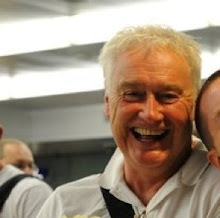
In the week they buried Elizabeth Taylor it seems appropriate to revisit Under Milk Wood, in which she appeared briefly as Rosie Probert at the height of her partnership with Richard Burton in the 1971 Technicolor version.
Even though playing a bit-part, Taylor was famously difficult, refusing to travel to Fishguard where the movie was being shot. Her scenes were filmed in London over the two days she had available before leaving England to avoid being collared for income tax, and the stills with a cameraman lying on the floor to get the only angle which flattered her low-slung figure and showed off the three Parisian nightdresses she’d demanded which cost half the costume budget.
Both Parisian nightdresses and Technicolor are absent from the Pentameters production. Colourlessness becomes a positive virtue in a play where the sounds are paramount, a day-in-the-life of a small Welsh fishing village seen through the eyes of a blind sea captain.
It starts well enough with a convincing blackout and a few minutes in which to let the imagery of the sleeping hamlet beside the ‘sloeblack, slow, black, crowblack, fishingboat-bobbing sea’ unfold in your head. Even without Richard Burton’s impassioned baritone, it works. Unfortunately as the lights come up, the scene is an anticlimax: an all-purpose set comprising a badly painted door panel, the back of a piano and a cheap flat-pack Welsh dresser certainly not borrowed from any self-respecting neighbouring kitchen here in Hampstead.
There are two ways Under Milk Wood is successfully performed: with a vast and colourful cast recreating as authentically as possible in costumes and props a fishing village in the fifties, or on an almost bare stage returning to the piece’s heritage as ‘a play for voices’. This production falls uncomfortably between the two stools with the five actors straining – a lot of the vocals are shouted – to portray in snapshot 64 different characters and using the all-purpose Welsh dresser as everything from captain’s bunk to wild wooded hillside, but equally using all-purpose accents which, even to my one-sixteenth-Welsh ears, sounded occasionally English in their inflections and certainly more random than the quite specific lilt of Cardigan Bay where Dylan Thomas placed the village.
The play has been set to music, by director and onstage participant Tom Neill, but it’s the sort of self-consciously-worthy wheezing and whining compositions you might hear scraped out by a school orchestra and serves only as irritating punctuation while the actors clump on and off stage to their instruments. The music is massively better when the cast sing, finely in two- or four-part harmony for example in the first-act closer of the Reverend Eli Jenkins’ morning service in which Tom Neill and Thomas Heard counterpoint particularly well together.
Even when shared among only five pairs of hands, the material can shine, and the bickering of Mrs. Ogmore-Pritchard with her two deceased husbands, or Butcher Beynon’s taunting of his wife with the liver of her pet cat are quite nicely pointed.
It’s a heart-felt production: Pentameters founder Leonie Scott-Matthews introduced the evening with a personal memoir of Dylan Thomas’s daughter Aeronwy, who read and dedicated her own poems on this same stage, and Neill’s affection for the work is palpable. Sometimes the best that a fringe production can do is to indicate that a classy revival is overdue. Hopefully the National or the Donmar will hear this clarion call from Hampstead and give Under Milk Wood the production it deserves.
This review written for The Public Reviews






